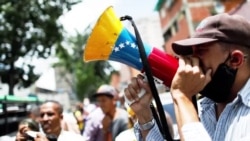On August 11, Venezuelan President Nicolas Maduro praised his deceased predecessor, Hugo Chavez, tweeting:
“[I]n 1999, with the swearing-in of Commander Chavez, the road to the profound transformation of the Homeland was illuminated. Historic moment for the beginning of the leading democracy that today we continue to deepen together with the people.”
That claim is false. Venezuela has not been a “leading democracy” under Chavez or Maduro, who has continued his predecessor’s autocratic ways.
During his 14 years as president, Hugo Chavez initiated constitutional and political changes in Venezuela, some of which, analysts say, were power grabs that effectively squelched true democracy and made him a de facto dictator.
After Chavez died in 2013, Maduro tightened this grip on power by further narrowing the space for civil rights and liberties. Economic and social turmoil in Venezuela deepened into a “humanitarian crisis,” according to the United Nations, and global think tanks began ranking its political system as “hard autocracy.”
It didn’t start that way.
Chavez, first elected as Venezuelan president in 1998, won four consecutive elections and ruled until his death. During his first inauguration, Chavez pledged to preside over Venezuela’s democratic transformation. Historians praised him for implementing social and economic reforms, among them the inclusion of the impoverished, indigenous peoples and women in politics. He expanded subsidized food distribution programs and affordable housing for low-income families and made health care accessible to most of Venezuelans.
But along with positive reforms, there were changes that paved the way for political and economic instability.
In 1999, Chavez championed constitutional reforms that shifted key government controls and powers to the president and the military. In 2009, a constitutional referendum passed that eliminated term limits for public offices, including the presidency, allowing Chavez to run for president again in 2012.
Chavez “dramatically altered the constitutional and democratic traditions in Venezuela,” the Harvard Political Review said, leading to a “sharp polarization within Venezuela, and a weakening if not destruction of the institutions of representative democracy.”
In a 2011 book “Dragon in the Tropics,” academics Javier Carrales and Michael Penfold examined the rise of “chavismo,” the popular movement in Venezuela and beyond inspired by Chavez. “Chavez has reshaped a frail but nonetheless pluralistic democracy into a semi-authoritarian regime,” they wrote.
The initial success of Chavez’s social reforms was subsidized by high world prices for oil, the country’s main resource. But they didn’t last.
Just a year after Chavez’s death, plunging oil prices drove the country to the point of economic collapse, “with shortages of everything from toilet paper to antibiotics and food,” Bloomberg reported in 2019.
Venezuela saw political unrest and mass protests, and political opponents contended with Maduro for presidency, claiming his election victory had been fraudulent. Maduro’s response was typical for authoritarian regimes, the U.S. think tank Freedom House wrote in its 2020 report.
“Venezuela’s democratic institutions have deteriorated since 1999, but conditions have grown sharply worse in recent years due to the continued concentration of power in the executive and harsher crackdowns on the opposition. The authorities have closed off virtually all channels for political dissent, restricting civil liberties and prosecuting perceived opponents without regard for due process. The country’s severe humanitarian crisis has left millions struggling to meet basic needs, and driven mass emigration.”
Freedom House rated Maduro’s government zero out of four possible points for adherence to democracy. “Venezuela does not function as a representative democracy,” the report said.
In recent years, several Latin American trade and political blocs expelled or suspended Venezuela for straying from democratic values.
Canada severed diplomatic ties with Venezuela in 2019 amid a political crisis following a disputed election in which Maduro claimed victory. Canada imposed a series of sanctions for "anti-democratic actions, particularly relating to the repression and persecution of the members of the interim government, censorship, and excessive use of force against civil society, undermining the independence of the judiciary and other democratic institutions."
The Democracy Matrix, a research project of Germany’s University of Wurzburg, labeled Venezuela’s political system a “hard autocracy” and ranked it 159th out of 176 countries in terms of “quality of democracy.”
The Economist Intelligence Unit, in its 2020 World Democracy Index, ranked Venezuela 140th out of 167 countries, with a democracy score of 2.88 (out of a possible 10).






